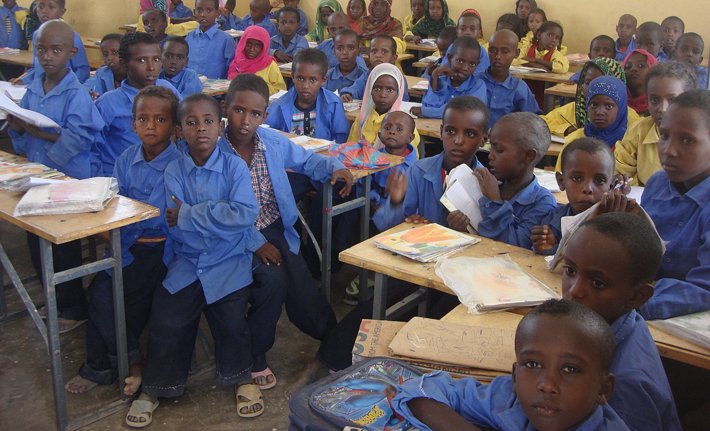It’s one of the most dreadful countries for religious freedom and it has shown no sign of improving.

That’s the conclusion of the United States Commission on International Religious Freedom (USCIRF) about the African country of Eritrea in the federal body’s 2020 annual report, an exhaustive assessment of 29 countries on implementation of the right to freedom of religion or belief.
Released April 28, the report provides a series of recommendations to the U.S. administration, State Department, and Congress, based on religious freedom conditions in 2019.
Eritrea is among 14 “countries of particular concern” (CPCs) identified by the USCIRF for “systematic, ongoing, and egregious” violations of religious freedom. Nine of the 14 countries—Burma (Myanmar), China, Eritrea, Iran, North Korea, Pakistan, Saudi Arabia, Tajikistan and Turkmenistan—were designated CPCs by the State Department in December 2019. In its report, the USCIRF asked the State Department to re-designate all nine countries as CPCs and add to the list five others—India, Nigeria, Russia, Syria and Vietnam.
At a time of steadily declining religious liberties across the globe, the USCIRF stated, Eritrea permitted no new religious institutions to officially register in 2019, thereby limiting the nation’s religious domain to just four religious communities: the Coptic Orthodox Church of Eritrea, Sunni Islam, the Roman Catholic Church, and a Lutheran-affiliated denomination known as the Evangelical Church of Eritrea.
Last year, according to the report, Eritrea’s government responded ruthlessly to a spike in political activism, coupled with calls for democratic reform by religious and secular Eritreans. This included members of both registered as well as unrecognized groups, such as the Pentecostal and Evangelical communities, who were accused of political interference for defending their beliefs and human rights.
Arbitrary arrests and detentions of hundreds of Christians—including a wave of arrests of at least 171 adults and children for assembling for worship in May 2019—was a defining feature of Eritrea’s eroding religious freedom climate.
Last year also marked the deaths in prison of some Eritreans who were subjected to mass arrests in the previous two years for protesting state interference in the affairs of a leading Islamic school, Al Diaa. The deceased included senior members of the school board, such as Hajji Ibrahim Younes, a member of the executive committee, the report stated.
Throughout 2019, government authorities closed and forcibly took over faith-based schools of several denominations as well as 22 health centers run by the Catholic Church, the report stated, adding that in April, Eritrean Catholic bishops wrote a joint letter calling for national truth and reconciliation.
The Patriarch of the Eritrean Orthodox Church, Abune Antonios, continued to languish in detention throughout 2019. Some leaders of the Full Gospel Church and the Eritrean Orthodox Church have been behind bars for more than 15 years.
A bipartisan, independent federal government body created by the 1998 International Religious Freedom Act, the USCIRF said in its report that it has created a new “Victims List” of people, including Eritreans, imprisoned for practicing their faith. The list classifies people who have been detained, “disappeared,” imprisoned, forced to renounce their faith, or are under house arrest.
Jehovah’s Witnesses continued to be denied the right to freely practice their faith in Eritrea. The report stated that the country denied them basic citizenship rights because followers, adhering to their religious beliefs, abstained from voting in the referendum for Eritrean independence from Ethiopia in 1993.
As many as 52 members of Jehovah’s Witnesses remained in prison as of last year—for following their religion by doing such things as meeting each other, preaching or being conscientious objectors to military service.
As the USCIRF has done in the case of several other countries, the federal body recommended in its report that the U.S. administration impose targeted sanctions on government agencies and officials in Eritrea responsible for severe violations of religious freedom. The recommended sanctions include freezing of officials’ assets and barring their entry to the U.S. under human rights and visa laws related to religious freedom violations.
The report also recommended that the U.S. government use bilateral and multilateral diplomatic channels to urge the Eritrean government to unconditionally free detainees imprisoned because of their religious activities. The report also suggested that Washington urge Eritrea to end the persecution of unregistered religious groups and communities and to make public the country’s registration laws, clearly specifying guidelines for applying for religious recognition or appealing the government’s decisions whereby recognition is denied.
From its beginnings, the Church of Scientology has recognized that freedom of religion is a fundamental human right. In a world where conflicts are often traceable to intolerance of others’ religious beliefs and practices, the Church has, for more than 50 years, made the preservation of religious liberty an overriding concern.
The Church publishes this blog to help create a better understanding of the freedom of religion and belief and provide news on religious freedom and issues affecting this freedom around the world.
For more information visit the Scientology website or Scientology Network.


